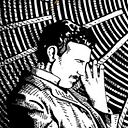As a teacher in the humanities, I often find myself making the case for literature. As in, why does this stuff still matter? In an era where we can find good, even terrific, stories in our multimedia world of television, film, video games, and in journals like this one, why bluster on about books?
I’m talking about good old-fashioned literature, the stuff that gets printed on pages of wood so thin you can see through it. Books that have little black hatch marks with no pictures. It’s a miracle to me that these hatch marks form letters, and those letters form words that form sentences that form ideas, ideas which create images, and movement, and people, and worlds, all in our minds instead of on a screen. What a strange phenomenon, to transmit pictures from one human mind to another, in such a direct yet coded way.
Ivory-towered professor though I may be, I realize not everyone has the same romance with stories that I do. So, to build my case, I find myself calling upon quotes from authors who connect stories to the art of being human. For example, historian Barbara Tuchman says, “Books are humanity in print.” Azar Nafisi, in her outstanding new book, The Republic of Imagination, claims that stories “link us to our past, provide us with critical insight into the present, and enable us to envision our lives not just as they are but as they should be or might become.” Or, to take it a step further, stories lead us places we might never have imagined we could go. As F. Scott Fitzgerald says, “Draw up your chair to the edge of the precipice, and I’ll tell you a story.”
But all this may be too theoretical, too abstract. What if, instead, I argued that through literature we not only connect with humanity, but we have the potential to fall over a singular kind of precipice: to fall in love?
I fell in love with my husband over a book. Lonesome Dove, to be precise, that doorstopper of a western by Larry McMurtry that won the 1985 Pulitzer. When I met him (Kern, not Larry), he had blond hair, round glasses, and the kind of eye-popping striped shirts every good-old-boy in Texas wore in the 90s. We were both attending the graduation of his twin sisters from college; they were my girlfriends, and he was their older brother with a thick West Texas accent and cowboy boots worn-down at the heel.
I was twenty-one, had a long ponytail, a tan, and was in the habit of wearing cutoffs. As the story goes, he noticed.
A group of us decided to go dancing after graduation, because there wasn’t a whole lot else to do back then in College Station. Still isn’t. Later that evening though, one by one, the group fell apart until Kern and I, strangers, were the last two standing. “Want to go?” he asked me. “I’ll go if you will.”
I did. In my group of girlfriends, I was always the one who took risks. I graduated high school a year early, hitting college at seventeen. One summer I worked as an adventure coach, showing camp kids how to spelunk and canoe and ride a zip line. I’d just spent two months teaching English in Macedonia, and I’d hitchhiked across Greece to see the ocean at Thessaloniki. Going dancing with a good looking boy with stellar character references weren’t no big thing.
That night, just the two of us, we piled up in his truck which he’d named Ol’ Blue, a truck that was the electric blue that the racier girls in junior high wore as eyeliner (see picture below), and we spent the evening spinning across the sawdust floors at The Hall. When Kern asked me if I wanted a drink, I told him, “I’ll have what you’re having,” mostly because I had no idea what kind of beer to order. He proved to be an excellent dancer — confident and smooth — and he was funny and well-spoken in the pauses between songs.
After dancing until our feet were sore, Kern and I drove back and both spent the night at the twins’ condo, me on the couch and he on the floor like a gentlemen. He’d showered upstairs and came down wearing an undershirt and shiny red gym shorts that were P.E. issue from the junior high where he coached basketball. (He wants you to know: he still has those shorts.) The only people still awake in the house, we stayed up until the wee hours … talking. We talked about ourselves, and we talked about books. One book in particular: Lonesome Dove.
Like me, Kern had fallen in love with Lonesome Dove’s main characters, Gus and Call. He knew the book’s many characters by name, and he knew each of their stories as if he’d gone on that cattle drive from Texas to Montana with them. Of course, figuratively speaking, he had. He laughed over Deets constantly fixing those patchwork pants. He’d been brokenhearted over Jake Spoon’s fecklessness, and the hard choices of honorable men drawing lines beneath a rare prairie tree. He wished Gus had stayed in Nebraska with Clara. And we both agreed that Blue Duck was the scariest villain in fiction.
Here was a man — Kern, not Blue Duck — who could dance, had a job, and cared enough about his little sisters to drive hours to attend their graduation and pick up their piece-of-crap car (We called it The Turd.) to drive home to Denton so he could fix it. And this man could read. He read good books, big Pulitzer-Prize winning books, just because he liked them. Not to impress a girl, not for a class, but simply because he wanted to. Maybe it speaks to my naïveté at the time, but I was astounded. And maybe just a wee bit smitten.
The next day we went our separate ways. I had had a great time, but I wasn’t thinking about dating. I was living in Houston with a degree in English, trying to get a job. Kern drove the several hours home in The Turd, forgetting to listen to the radio the whole way. He knew, he says, that he wanted to marry me. He had to find a way to lure me up to Denton so we could date.
When he got home in The Turd, Kern sent me a copy of the employment ads from the Denton paper. “I hope you find something that rings your bell,” he wrote. With the ads, he included a list of some of his favorite books, with recommendations for me to read.
I didn’t know when I received this letter that I would fall in love with the man who wrote it. I didn’t know that he and I would marry and move to Amarillo, Texas, a dry and dusty place whose weather at times would remind me of the Hat Creek Cattle Company in Lonesome Dove. I had no idea we would raise two children together, smart, funny children who would grow up to love to read and dance. I could never have predicted that one day I’d earn my PhD and teach at the university where Larry McMurtry got his start. (Holla University of North Texas. Go Mean Green!) And I wouldn’t have imagined, in my wildest dreams, that I’d go on to write my own books, or that Kern, that green-eyed cowboy, would haul me all over Texas and beyond to meet fellow booklovers at signings and conferences.
Who would have thought? At the time, we were starry-eyed kids bumping hearts at the crossroads of a story. Now, over twenty years later, once again the only ones awake in the house, we’re still sharing stories, talking about books, and falling in love.
Yes, literature matters. Yes, it’s the gateway to humanity, and in it we find the capacity to understand those who are different than ourselves. Our hearts and our minds become broader and better for having read it.
What’s more — and I know this is true from personal experience — literature, and the humanity we find within its pages, may just lead us to meet the loves of our lives.
BRITTA COLEMAN is the author of Potter Springs, from Hachette. She teaches writing and literature at the University of North Texas, where she still talks about Larry McMurtry and falling in love. You can find her blog at BrittaColeman1.blogspot.com or follow her on Twitter: @BrittaColeman.
Essay originally published on 2/14/15

